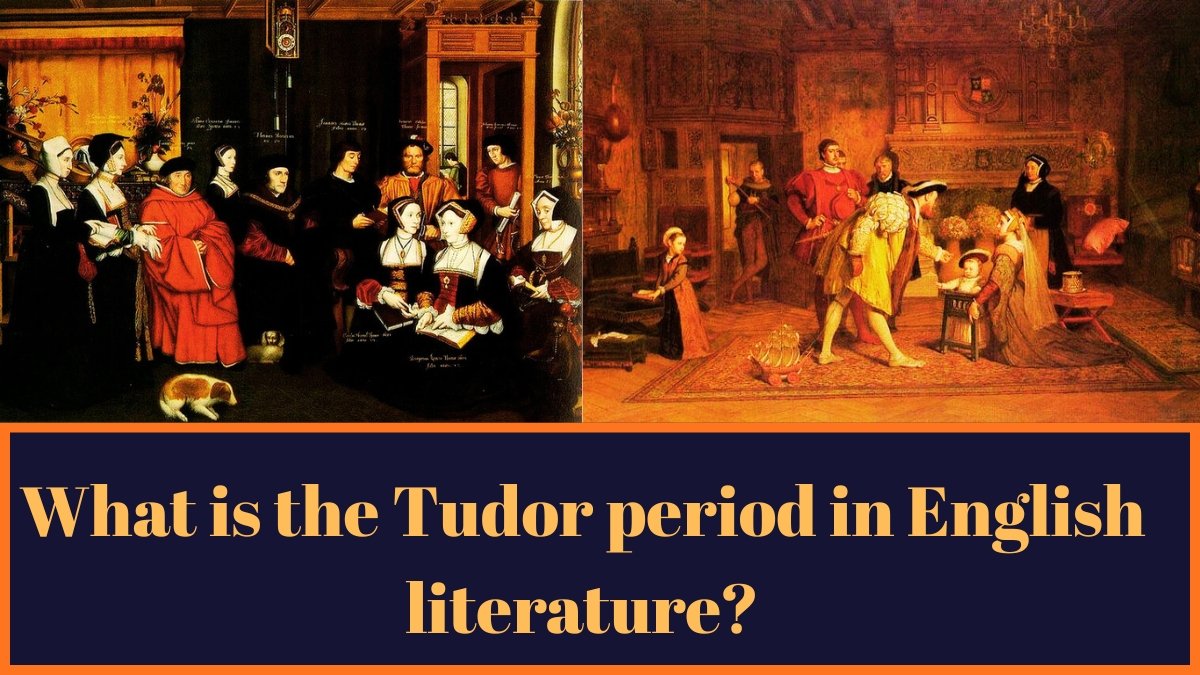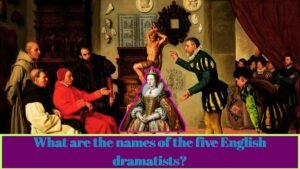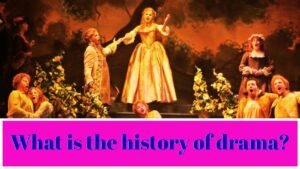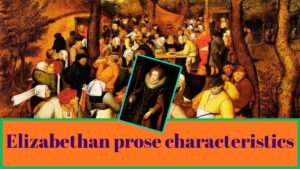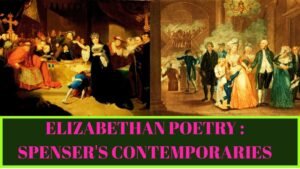What is the Tudor period in English literature?
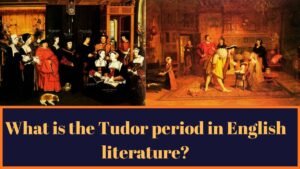
The Tudor period in English literature:The first fruits of the Renaissance: Tottel’s Miscellany-Wyatt and Surrey: their sonnets-Surrey’s blank verse-Minor poets between Surrey and Spen-ser: Sackville, Gascoigne, etc-Prose of the Humanists, Ascham and others-The Bible translations.
Who were the authors of the early Tudor period?
In 1557 appeared the first fruits of the Renaissance in the famous collection of songs and sonnets by Wyatt and Surrey and some others, called after the name of its publishers, Tottel’s Miscellany. Sir Thomas Wyatt (1503-42) and Henry Howard Earl of Surrey (1517-47), the two ‘courtly makers’ (poets) of the Court of Henry VIII were deeply influenced by the Italian renaissance and it was they who injected fresh life into English poetry by bringing from Italy the passionate love poetry of Petrarch and the verse-form called the sonnet. The Petrarchan sonnet contains fourteen lines divided into two groups of eight (octave) and six (sestet). The octave rhymes abba, abba, and the sestet cdc, cdc, or cde, cde, or in other variations. Surrey modified the form into three quatrains, (fours) with different rhymes abab, eded, efef and a final couplet gg The form established by Surrey was later adopted by Shakespeare and has come to be called Shakespearean. The sonnet with its highly conventional and strict technique provided to these reformers of English poetry just the discipline they needed and called forth all their craftsmanship. Being pioneers and innovators they were handi -capped at first by the still unsettled state of pronunciation, and their first experiments are consequently not free from defective accentuation. But on the whole they succeeded in restoring to Eng-lish versification the regularity and flexibility which it had lost during the century following Chaucer.
An important consequence of the introduction of the sonnet was the revival of lyricism or personal poetry which had been almost dead since the thirteenth century and of which even Chaucer had so little. Both Wyatt and Surrey died young; Surrey was barely
thirty wnen ne fell a victim to the terror of the last years of Henry VIII’s reign and was executed on a false charge of treason. The poems of both are sweet and graceful; the chief difference between them is that while Wyatt’s lyrics are frank and manly in tone with nothing of the timid self-abasement of the conventional lover, Surrey’s are elegiac in mood and are marked by his love of nature. Moreover, Surrey, though he stood in the relation of pupil to his master Wyatt, is a more accomplished craftsman. If Wyatt has the credit of introducing the Petrarchan sonnet, Surrey has the no less credit of inventing the English or Shakespearean form. But Surrey’s greatest claim to distinction lies in his use, for the first time in English poetry, of blank verse in his translation of the second and fourth books of Virgil’s Aeneid. This too he borrowed from the Italians. His blank verse is rather stiff because of its tendency to be end-stopped, to complete the sense, that is to say, at the end of each line; but even so it is handled with skill and is not unpleasing. Under the new influence of the classics rhyme had come to be re-garded as a barbarity. This, of course, was wrong, but the import-ance of the new metre cannot be too much emphasised. It was des-tined to become the metre of the drama and the epic. Between them Wyatt and Surrey opened ‘fresh fields and pastures new’ to English poetry. Without them as pioneers the Elizabethans could never have taken the long strides they did in the forward march towards the glorious achievements of Spenser, Marlowe, Shakespeare and Milton.
The work of these two poets was not followed up immediately by their successors. A whole generation passed before it bore fruit in the work of Spenser. Not that no poetry was written in the interval. On the contrary, Tottel’s Miscellany was followed by several others like the Paradise of Dainty Devices, A Gorgeous Gallery of Gallant Inventions, etc; but these contained nothing attractive except their titles. There are only two minor poets of any importance between Surrey and Spenser. Others are mere names Churchyard, Tusser, Turberville, Googe and the rest. The two exceptions are Sackville and Gascoigne. Quite apart from his poems, Sackville is important for his part in writing the first blank verse tragedy, Gorboduc or Fer-rex and Porrex, and Gascoigne is remembered for his blank verse satire, the Steel Glass. The only important thing to notice about these undistinguished poets is that they did not sink to the doggrel of the fifteenth century.
What is the early literature of England?
In considering the prose of this period we must remember that. as in poetry, we are dealing with a period of transition from the medieval through the early English Renaissance to its culmination under Queen Elizabeth. The development of the early Renaissance prose is bound up with the work of Humanists-scholars of Greck and Latin who were fired with the zeal to disseminate classical cul-ture, to import the literary ideals of Greek and Latin and generally to adapt English to Latin grammar and syntax.
The greatest prose work of the fifteenth century, Malory’s Morte d’Arthur, was medieval in outlook. It looked backwards and not forward, and being unique in its kind could not be followed. Hav-ing no models to follow every writer had to strike out a line for himself. The result was a highly idiosyncratic prose not only in this period but throughout the whole of the sixteenth and seventeenth centuries. The century of standard English prose-the eighteenth-was still far away. We should not be surprised, therefore, if we do not come upon any great prose works in this period outside the Bible for which a standard or traditional prose style was perforce created by the circumstances of the Reformation. The period was one of training in which English prose was exercised in many fields-history, politics, education, sermons, religious controversies and above all, translation of the Bible. For the sake of convenience the pioneers who stimulated by Humanism attempted prose writing may be divided into three groups; the Oxford Humanists, the Educationists, and the Translators of the Bible.
The Oxford Humanists-Linacre, Grocyn, Colet, More. The first three who had first-hand and deep knowledge of Greek and Latin helped to put the teaching of Greek on a sound foundation in the University of Oxford. Colet, Dean of St. Paul’s, founded the St. Paul’s school which became a model for secondary schools based on the teaching of Latin and Greek. It was for this school that Lily wrote the famous Latin grammar which reigned supreme in English schools until very recent times.
Thomas More (1478-1535), the friend of Erasmus and a pupil of the Oxford humanists noticed above, was the only one of this group to produce a work of literature. But his Utopia was in Latin and though written in 1516 it was translated into English after his death by Robinson. The book, inspired partly by Plato’s Republic and partly by current speculations on an ideal commonwealth, testifies to the writer’s great ability, deep culture and good nature. Broadly speaking. More visualised in his Utopia a kind of socialism not unlike the one our planners are trying to realise in India. The most significant thing, however, is its secular character, for every Utopian is free to profess any religion he likes. It is the work of a dreamer who sought to build an ideal state regardless of the practical application of his ideas. The Greek word ‘Utopia’ means nowhere and has given us ‘Utopian’, meaning fantastic, impractical.
It is a pity More wrote Utopia in Latin, for as such it does not belong strictly to English literature. His English works consist of his History of Richard III, his polemical writings and his Dialogue of Comfort against Tribulation. The only noteworthy thing about the History is the sinister picture of Richard III adopted and popularised by Shakespeare. His polemical writings against Tyndale and the Reformers do him little credit, for they are in flat contradic-tion of the advanced views he had expressed in his Utopia. The Dialogue, written tten during his confinement in the Tower awaiting execution, is the best of his English works. Intensely personal, it reveals the nobility, saintliness and charm of his character. Being less formal than the others, its style is homely and colloquial, enlivened with jests and humorous anecdotes. In his formal writings such as his History, the sentences are formless and inter-minably long and More cannot be said to have done much to improve English prose. ose. To counterbalance this More deserves the credit of having originated many homely and expressive words and phrases which are familiar to us in everyday speech. Such (Chambers’s Cyclopaedia of English Literature, Vol I, p. 124) are: out of sight, out of mind; he cannot see the wood for the trees; mad as March hare; dead as a door-nail; harping on the right string; perceiving chalk from cheese; our contemptuous reference to persons and things as not worth a fig, a straw, a rush, a button, etc. we owe to More.
The Educationists: Elyot, Cheke, Wilson, Ascham. With the exception of Elyot, all belonged to St. John’s College, Cam-bridge. Unlike More, this group wrote in English from the patrio-tic motive of improving its powers of expression. Thomas Elyot’s Governor, a treatise of moral and philosophical education for the governing class, and Sir John Cheke’s Heart of Sedition are just competent prose. ose. Sir Thomas Wilson in his Art of Rhetoric pleads for purity and simplicity of English, setting his face against ‘ink ‘ink horn terms’, ‘outlandish’ expressions and archaisms. Roger Ascham, the most famous of them all, was a tutor to Elizabeth. His Toxophilus attempts to revive the old national sport of archery for the physical training of youth. He condemns bookworms who would not vary their studies with physical recreation. ‘But I say it therefore be-cause I know, as little study getteth little learning or none at all, so the most study getteth not yet most learning of all. In the more famous, Schoolmaster, he discusses educational problems and specially the best method of teaching Latin. The method he advocates is that of translation and retranslation-the method he himself followed. Translate a piece of Latin into English. After a day or so translate the English version back into Latin. This method can be successfully adopted to learn any foreign language. The book is very entertaining, being full of the writer’s own experi-ences, reminiscences and anecdotes. The most interesting anecdote is that of his interview with Lady Jane Grey, described to support the view that love and gentleness are better persuaders of children to learning than beating. Though a great humanist himself he was more concerned with morals than with art and beauty. That is why he did not approve of the young Englishmen’s going to Italy, for the Italy of his day he regarded as a land of vice. He quotes the popular saying: Englishman Italianate, is a devil incarnate. Thus we see that both books of Ascham, though written from utilitarian motives, rise to the rank of literature by the charm of their matter as well as manner. He aimed at simplicity and brevity and attained them in a greater measure than any prose writer of his time. Making allowance for his time It would be no exaggeration to say that he is the first writer of classical English prose.
Translators of the Bible: Tyndale, Coverdale, Cranmer
me a Latimer. William Tyndale, the first translator of the Scripture after Wycliff, issued his translation of the New Testament in 1525 from Germany where he had taken refuge from the persecution of Henry He did not, however, escape the long arm of the King and was put VIII who was at the time still a bigoted opponent of the Reformation, to death in Holland. After the Reformation had become settled fact, Tyndale’s translation together with Miles Coverdale’s translation of the Old Testament appeared as the complete English Bible. This and several other translations which appeared in later years formed the basis of the famous Authorised Version of 1611. The importance of these Bible translations in forming English prose cannot be over-emphasised. The translators struck a nice balance between the pedantry of the learned and the vulgark ty of the illiterate. By a skilful use of the old Biblical language, simple yet dignified, and of a certain touch of quaintness, the translators achieved ieved a charm at once of the exotic and the familiar. Such memorable words and phrases as ‘flesh and blood’, ‘take his cross’, ‘the fat of the land’, ‘a labour of love’, ‘the eleventh hour’ ‘the shadow of death’, enriched not only English literature but lent grace and beauty to the speech of the masses.
To the translations of the Bible was added in 1549 the Book of Common Prayer prepared under Edward VI. This, a translation from the Latin prayer book, was in the main the work of Arch-bishop Cranmer and a solid contribution to English prose. It is a monumental work of inspiration, and poetic cadence.
Hugh Latimer, though not a stylist, deserves a place beside the translators by virtue of his sermons. These are vigorous attacks on the laziness of the Protestant clergy couched in simple and homely phrases of trenchant and telling censure. Faithful to the reformed creed, he was burnt at the stake in the reign of Mary. His last words to Bishop Ridley, a brother in martyrdom, are famous: “Play the man, Master Ridley; we shall this day light such a candle, by God’s grace, in England as I trust shall never be put out.”
The man who recorded the dying speech of Latimer, John Foxe, achieved still greater fame by his Book of Martyrs (1563), in which are recorded the heroic deeds and words of Protestant martyrs. It is in style plain and unadorned, depending for its appeal on its sincerity, exactness of detail, and drama. The book attracted wide attention even on the Continent and was perhaps the most popular book of the century after the Bible. It did more than any other piece of writing to spread hatred of Roman Catholicism in England.
A similar service was done to Scotland by John Knox’s History of the Reformation in Scotland.
